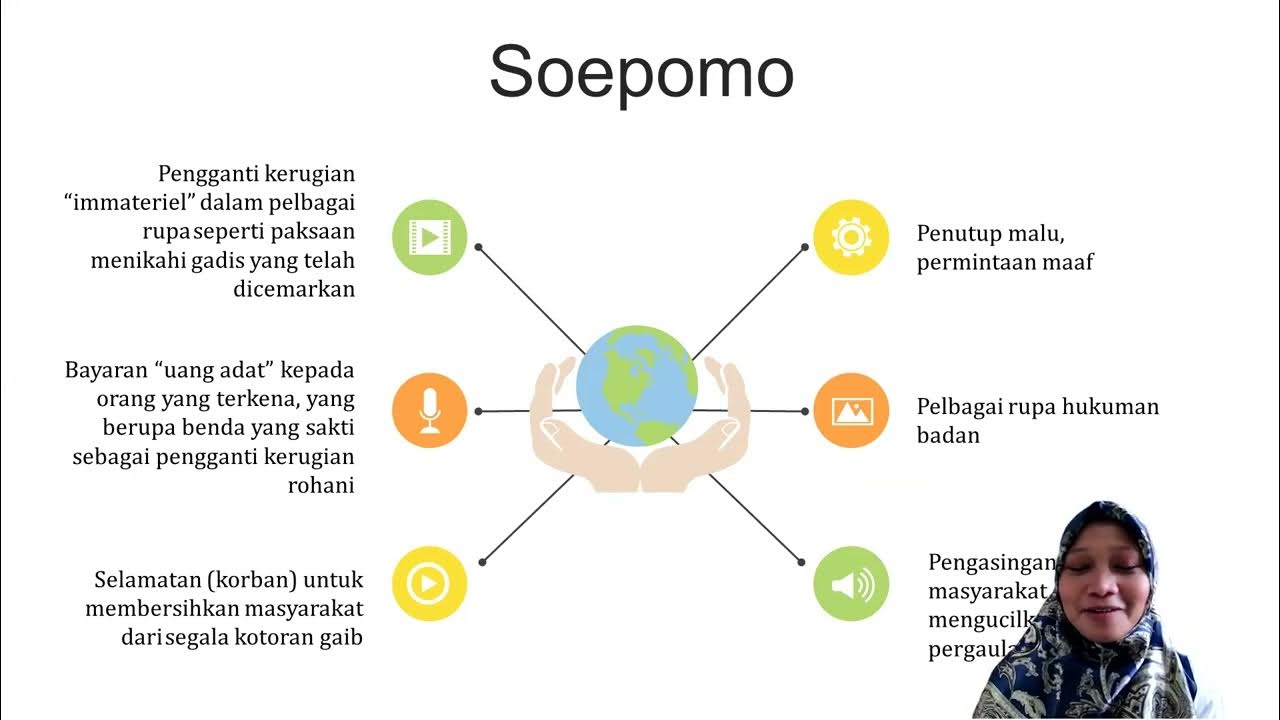Pertemuan Ke 11
Summary
TLDRThis video lecture discusses the concept of customary law (hukum adat) in Indonesia, emphasizing its significance in the diverse cultural and societal landscape of the country. The speaker explains that customary law, often unwritten, is a set of rules that governs society, based on tradition and local customs. The history of customary law is explored, dating back to the time before Indonesia became a formal state, with roots in the indigenous cultures. The video also touches on its recognition within the national legal framework and the role it plays in modern Indonesian society, particularly in rural areas where it remains deeply ingrained.
Takeaways
- 😀 Hukum adat is a type of law that is not written but is followed by society, and is recognized in Indonesia's constitution.
- 😀 Indonesia is a diverse country with many ethnic groups, languages, and cultures, which include different customary laws.
- 😀 Hukum adat, though not written, is an integral part of Indonesian society and governs daily life through traditions and customs.
- 😀 The concept of hukum adat was introduced by Snouck Hurgronje in the late 19th century, although adat laws existed long before his research.
- 😀 The term hukum adat refers to laws that arise from long-standing customs and practices within communities.
- 😀 Customary law is considered a 'living law' in Indonesia, especially in rural and mountainous areas where traditions are deeply rooted.
- 😀 The enforcement of hukum adat is often done consciously by community members who uphold the customs voluntarily.
- 😀 The key features of hukum adat include its origin in community habits, its unwritten nature, and its enforcement through social practices.
- 😀 Hukum adat can sometimes be documented, but it is typically practiced as an unwritten tradition within the community.
- 😀 Sources of hukum adat include community customs, legal precedents, opinions of adat leaders, and sometimes religious teachings, blending with local laws.
Q & A
What is Hukum Adat?
-Hukum Adat, or customary law, refers to unwritten laws that are followed by local communities in Indonesia. These laws are based on traditions and customs, and they govern societal behavior without being enforced by formal government regulations.
How is Hukum Adat different from government-made laws?
-Hukum Adat differs from government-made laws in that it is not written down or codified by a formal legal body. Instead, it is based on the customs and traditions that are passed down through generations within communities.
Who introduced the term 'Hukum Adat' and when?
-The term 'Hukum Adat' was introduced by Snok Horrons, a Dutch researcher, through his work in 1893. However, the practice of customary law itself had already existed long before that in Indonesian communities.
What does Article 18B(2) of the Indonesian Constitution say about Hukum Adat?
-Article 18B(2) of the 1945 Indonesian Constitution acknowledges the existence of Masyarakat Hukum Adat (Indigenous Law Communities) and their traditional rights. This article recognizes Hukum Adat as part of the legal framework in Indonesia.
Can Hukum Adat be written down?
-Although most of Hukum Adat is unwritten, there are instances where it is documented in writing. This could include community decisions or regulations that are formalized in written form to ensure their enforcement.
What is an example of a customary law in Indonesia?
-An example of a customary law in Indonesia is the practice of showing respect to elders by using honorifics such as 'Mas', 'Mbak', or 'Abang' instead of addressing them by their first names, which is an unwritten societal norm.
What is the significance of the term 'living law' in the context of Hukum Adat?
-The term 'living law' refers to the idea that Hukum Adat is not just theoretical or historical; it is actively practiced and lived by communities. Despite being mostly unwritten, it remains deeply ingrained in the daily life of Indonesian society.
How is the enforcement of Hukum Adat done in communities?
-The enforcement of Hukum Adat is typically done consciously by the members of the community. For example, people may adhere to customs like visiting ancestral graves during important events as part of a culturally ingrained practice.
What are some sources of Hukum Adat?
-Sources of Hukum Adat include customary practices passed down through generations, the opinions of respected community leaders, and in some cases, religious norms that are integrated with local traditions.
Why is Hukum Adat still important in rural and indigenous communities?
-Hukum Adat remains important in rural and indigenous communities because it is deeply tied to their cultural identity and social structure. It plays a central role in maintaining order, unity, and respect within the community, even in the absence of formal legal systems.
Outlines

This section is available to paid users only. Please upgrade to access this part.
Upgrade NowMindmap

This section is available to paid users only. Please upgrade to access this part.
Upgrade NowKeywords

This section is available to paid users only. Please upgrade to access this part.
Upgrade NowHighlights

This section is available to paid users only. Please upgrade to access this part.
Upgrade NowTranscripts

This section is available to paid users only. Please upgrade to access this part.
Upgrade Now5.0 / 5 (0 votes)





